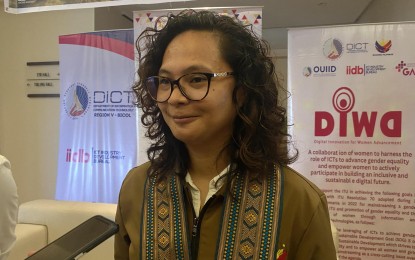
INCREASED CONNECTIVITY. Rachel Ann Grabador, DICT-Bicol regional director, answers media queries on the sidelines of the regional stakeholders' consultation on National Broadband Plan 2.0 (NBP) and National Emergency Communication Plan at The Oriental Hotel in Legazpi City on Tuesday (May 21, 2024). She said the updated NBP 2.0 will emphasize the strategic importance of public-private partnerships in expanding the country's investment capacity in digital infrastructure. (PNA photo by Connie Calipay)
LEGAZPI CITY – The Department of Information and Communications Technology (DICT) aims to increase the number of households with internet access nationwide from the current 44 percent to 60 percent by 2028.
In an interview on the sidelines of the regional stakeholders' consultation on National Broadband Plan 2.0 and National Emergency Communications Plan on Tuesday here, Maria Victoria Castro, Director for the National ICT Planning, Policy, and Standards Bureau, said through the National Broadband Plan 2.0, they will identify areas for collaboration between the government and private sector in upgrading and expanding digital connectivity and promote investments in telecommunications.
"The NBP 2.0 serves as the blueprint of the deployment of fiber optic cable and wireless technologies to improve the internet in our country. Our Philippine Development Plan has done something and based on their targets, 60 percent of Filipinos will be connected to the internet by 2028. Right now, (according) to the Philippine Statistics Authority (PSA), about 44 percent of our households are connected to the internet. We want to increase the target over the years. If we can improve the NBP, (it) will increase even more)," Castro said in Filipino.
To ensure the collaboration of government agencies and private stakeholders, she said the DICT has been conducting a series of focus group discussions and consultations nationwide aimed at strategically harmonizing the efforts of public and private sectors and addressing gaps towards the improvement of the digital infrastructure landscape.
Before Legazpi, the DICT NBP 2.0 consultation has already been conducted in Clark, Leyte, and Zamboanga. The next locations will be Tuguegarao City, Cagayan, and the National Capital Region.
Rachel Ann Grabador, DICT-Bicol regional director, said with the current administration's directives, the updated NBP, or NBP 2.0, will emphasize the strategic importance of public-private partnerships (PPPs) in expanding the country's investment capacity in digital infrastructure.
She said at present, a total of 2,225 free Wi-Fi for All units have been installed in 830 locations across the region.
The three-day NBP 2.0 consultation here from May 21-23 is being participated by representatives from national government agencies, local government units, the private sector and students who are attending various meetings, seminars and workshops related to the strengthening of internet service in the Bicol region.
Topics include Gearing toward Universal and Meaningful Connectivity; Enhancing Digital Infrastructure Governance; and Intensifying Strategic Collaboration and Investment in Digital Connectivity, among others. (PNA)
 The Philippine News Agency is a web-based newswire service of the Philippine government under the supervision of the News and Information Bureau (NIB) of the Presidential Communications Office (PCO).
The Philippine News Agency is a web-based newswire service of the Philippine government under the supervision of the News and Information Bureau (NIB) of the Presidential Communications Office (PCO).